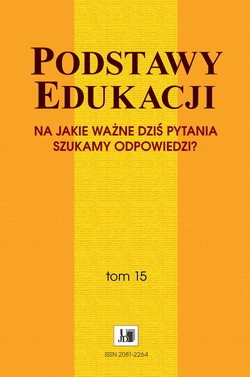Education on the verge of changes. The process of education in terms of the cybernetic theory of character
Education on the verge of changes. The process of education in terms of the cybernetic theory of character
Author(s): Izabela ZIĘBACZSubject(s): ICT Information and Communications Technologies, Globalization, Sociology of Education, Distance learning / e-learning, Pedagogy
Published by: Uniwersytet Jana Długosza w Częstochowie
Keywords: cybernetics; education; knowledge management;
Summary/Abstract: Contemporary change processes in the sphere of education are multi-context and determined by various factors. Undoubtedly, the factor organizing the discussion on the new model of education is the uncertainty related to the shape of the future. This uncertainty is caused by the direction of changes in the area of functioning and development of societies and the emergence of the knowledge-driven economy. These changes, in turn, are the result of the impact of mega trends, including the development of new information and communication technologies (ICT), globalization of various spheres of life, progressive phenomena of socio-economic polarization, cultural changes, acceleration of migration processes, etc. These changes set the framework for processes of education and upbringing generate numerous challenges in educational activity related to fundamental issues: how to teach? by what methods? What kind of results to expect? (Wasyluk et al., 2020). Educational institutions play an important role in this process, including universities, “where self-steering prevails over learning, externally guided” (Laurisz, 2022). M. Mazur’s (CTC) (1976) cybernetic character theory, pioneering on a global scale, is a proposition of a response to these educational challenges. This work is an attempt to use the CTC to identify the parameters of character of the studied students in the field of social work. The proposed solution may support didactic processes by optimally matching the efforts and capabilities of students to the needs of the education process.
Journal: Podstawy Edukacji
- Issue Year: 2022
- Issue No: 15
- Page Range: 189-202
- Page Count: 14
- Language: English

